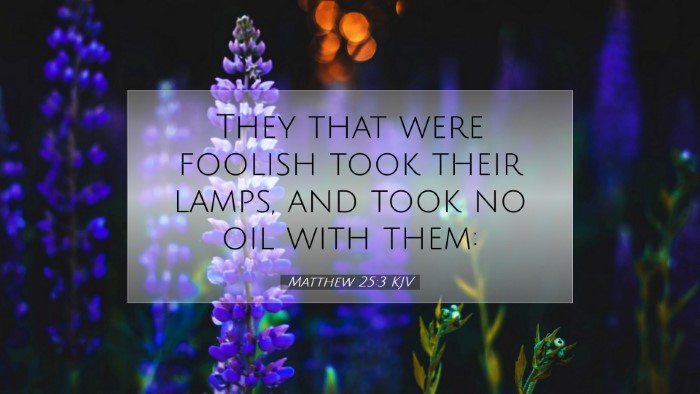Commentary on Matthew 25:3
Verse Reference: Matthew 25:3 - "They that were foolish took their lamps, and took no oil with them."
Introduction
Matthew 25 contains the Parable of the Ten Virgins, which serves as a poignant reminder of readiness and the importance of being prepared for the coming of the Lord. This particular verse, Matthew 25:3, points to the crucial element of oil, symbolizing preparedness for the journey ahead. The interpretation of this verse can be drawn from several public domain commentaries, including those of Matthew Henry, Albert Barnes, and Adam Clarke, providing a comprehensive understanding essential for pastors, students, and scholars.
Contextual Background
This parable is situated in the Olivet Discourse, where Jesus instructs His disciples about the end times and His second coming. The ten virgins symbolize the church, portrayed as brides waiting for the Bridegroom. With five being wise and five foolish, the narrative underscores the division between those who are prepared and those who are not.
Insights from Commentaries
Matthew Henry's Commentary
Matthew Henry emphasizes the importance of the oil, which symbolizes the grace of the Holy Spirit. He explains that the wise virgins not only took their lamps, but they also prepared themselves by bringing extra oil, signifying a diligent commitment to spiritual readiness. The foolish, on the other hand, are criticized for their lack of foresight—representing believers who fail to cultivate their spiritual lives, thus unprepared for the unexpected return of Christ.
Albert Barnes' Notes on the Bible
Albert Barnes expands on the implications of this passage, noting that the oil represents good works, faith, and the indwelling Holy Spirit. Barnes stresses that the parable highlights the necessity of personal responsibility in one’s spiritual journey. The wise virgins are seen as those who have secured a relationship with God and have actively pursued holiness and righteousness, whereas the foolish virgins reflect those who rely on communal faith and external appearances without personal commitment.
Adam Clarke's Commentary
Adam Clarke provides a detailed analysis of the symbolism within the parable, pointing out that the lamps without oil are inadequate for illumination. He notes that this signifies the insufficiency of mere profession of faith without corresponding actions. Clarke admonishes the reader to recognize that preparation involves action—seeking the Holy Spirit, engaging in prayer, and living a life consistent with one’s faith. The emphasis on personal preparation contributes to the overarching theme of accountability before God.
The Significance of Oil
- Symbol of the Holy Spirit: The oil is often interpreted as the presence and empowerment of the Holy Spirit in the life of a believer. Without this spiritual resource, the lamps—indicative of faith—would not shine brightly in the darkness.
- Preparedness: The necessity of carrying extra oil underscores the importance of being ready at all times, especially in a world filled with distractions and temptations that can hinder one's spiritual growth.
- Individual Accountability: Each virgin's responsibility for her own oil reflects the personal nature of faith. One cannot borrow the Spirit or the good works of others; each must cultivate their relationship with God.
Theological Implications
This verse, along with the larger parable, raises fundamental theological questions regarding the nature of salvation and preparedness. It invites each believer to reflect on their spiritual state and urges a deep commitment to nurturing their relationship with Christ. The foolish virgins did not act in accordance with wisdom and were ultimately unprepared for the coming of the Bridegroom.
Practical Applications
For pastors and theologians, this verse serves as a profound reminder to encourage congregants to actively engage in their faith. The importance of fostering spiritual disciplines—prayer, reading Scripture, and participating in community worship—cannot be understated. Moreover, it calls for vigilance in personal spiritual lives to avoid complacency.
- Spiritual Discernment: Encourage members of the faith community to cultivate discernment in their spiritual walk.
- Teaching on Readiness: Utilize this parable in sermons to teach on the importance of being spiritually alert and prepared.
- Community Building: Foster communities where individuals can support each other's spiritual growth, thus sharing the oil of faith.
Conclusion
Matthew 25:3 serves as both a warning and an encouragement for believers. The call to be wise and prepared resonates across generations, challenging the church to actively pursue a robust relationship with God. Through insights gleaned from the commentaries of Matthew Henry, Albert Barnes, and Adam Clarke, this verse deepens the understanding of personal responsibility in faith and the vital necessity of the Holy Spirit's presence in preparing for the Lord's return. May this serve to ignite a passion for holiness and preparedness in the hearts of all who encounter this profound scripture.


